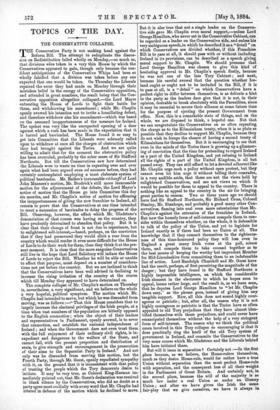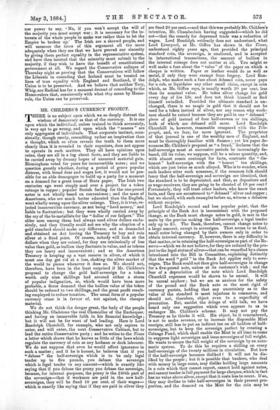TOPICS OF THE DAY.
THE CONSERVATIVE COLLAPSE.
THE Conservative Party is not making head against the Reform Bill. The attempt to reduplicate the discus- sion on Redistribution failed wholly on Monday,—so much so, that divisions were taken in a very thin House by which the Conservatives appeared to gain, though only because the con- fident anticipations of the Conservative Whips had been so wholly falsified that a division was taken before any one expected that one would be taken. On Thursday the Liberals repaired the error they had made on Monday through their mistaken belief in the energy of the Conservative opposition, and attended in great numbers, the result beimg that the Con- servative opposition altogether collapsed,—the Lord Mayor entreating the House of Lords to fight their battle for them, and withdrawing his amendment ; while Mr. Chaplin openly avowed his intention not to invite a humiliating defeat, and therefore withdrew also his amendment—which Was based on the assumed inopportuneness of the measure for Ireland. The upshot was very like the unexpected opening of a door against which a rush has been made in the expectation that it is barred and barricaded. The House found it so easy to get into Committee that the Liberals were solemnly called upon to withdraw at once all the charges of obstruction which they had brought against the Tories. And we are quite willing to admit that for the moment the obstructive policy has been overruled, probably by the sober sense of Sir Stafford Northcote. But till the Conservatives saw how determined the Liberals ware to waste no time in repeating over and over again what had been argued even ad nauseam before, they had certainly contemplated employing a most elaborate system of political barricades. Mr. Raikes's inexcusable re'ehauffe of Lord John Manners's motion, Mr. Brodrick's still more inexcusable motion for the adjournment of the debate, the Lord Mayor's notice of motion that the House go into Committee this day six months, and Mr. Chaplin's notice of motion for affirming the inopportuneness of giving the new franchise to Ireland, all remain to prove that the Conservatives at one time intended to erect a succession of barricades to delay the progress of the Bill. Observing, however, the effect which Mr. Gladstone's denunciation of that course was having on the country, they have prudently determined to abandon that policy. But it is clear that their change of front is not due to repentance, but to enlightened self-interest,—based, perhaps, on the conviction that if they had persevered they would elicit a roar from the country which would render it even more difficult for the House of Lords to do their work for them, than they think it at the pre- sent moment. It is clear that the more sanguine Conservatives still live in the hope that Lord Salisbury will induce the House of Lords to reject the Bill. Whether he will be able or unable to effect that purpose, must depend on a number of considera- tions not yet before the country. But we are inclined to think that the Conservatives have been well advised in declining to increase the rising irritation of the country at the course which till Monday they appeared to have determined on.
The complete collapse of Mr. Chaplin's motion on Thursday is, nevertheless, a very significant, and we believe on the whole a very hopeful, political symptom. The motion which Mr. Chaplin had intended to move, but which he was dissuaded from moving, was as follows :—■" That this House considers that to largely increase the electoral privileges of the Irish people, at a time when vast numbers of the population are bitterly opposed to the English connection ; when the object of their leaders and representatives in Parliament, openly avowed, is to sever that connection, and establish the national independence of Ireland ; and when the Government dare not even trust them with the full enjoyment of their ordinary civil rights, is in- expedient and dangerous to the welfare of the State, and cannot fail, with the present proportion and distribution of seats, to give strength and encouragement in the prosecution of their aims to the Separatist Party in Ireland." And not only was he dissuaded from moving this motion, but the Fourth Party, through Mr. Gorst, openly repudiated sympathy with it, on the ground that it is inconsistent with that policy of trusting the people which the Tory democrats desire to initiate. It may be very true, as Colonel King-Harman im- mediately pointed out, that Mr. Gorst's declaration was received in blank silence by the Conservatives, who did no doubt as a party agree most cordially with every word that Mr. Chaplin had uttered in defence of the motion which he declined to move.
But it is also true that not a single leader on the Conserva- tive side gave Mr. Chaplin even moral support,—unless Lord George Hamilton, who never sat in the Conservative Cabinet, can be regarded as a leader on the Conservative side, and unless his very ambiguous speech, in which he described it as a "detail " on which Conservatives are divided whether, if this Franchise Bill is to pass at all, it should pass with or without including Ireland in its provisions, can be described as a speech giving moral support to Mr. Chaplin. We should pregame that Lord George Hamilton was chosen to give this kind of hesitating approval to Mr. Chaplin's speech firstly, because he was not one of the late Tory Cabinet ; and next, because his careful avowal that the question whether Ire- land ought or ought not to be included in the Bill, if it is to pass at all, is a " detail " on which Conservatives have a perfect right to differ between themselves, is as delicate a hint to the party as the leaders dare give that it is not, in their opinion, desirable to break absolutely with the Parnellites, since it may be essential to secure their alliance at some future time for the purpose of ejecting the present Government from office. Now, this is a remarkable state of things, and on the whole, we are disposed to think, a hopeful one. Not that we can congratulate the Conservatives on so often repeating the charge as to the Kilmainham treaty, when it is as plain as possible that they decline to support Mr. Chaplin, because they do not wish to forego the chance of having a second treaty of Kilmainham for themselves. But it is encouraging to see that even in the minds of the Tories there is growing up a glimmer- ing of conviction that the time for pretending to regard Ireland as a part of the United Kingdom, and yet refusing to Ireland all the rights of a part of the United Kingdom, is all but passed away. They can still afford to let a devoted adherent like Mr. Chaplin urge such a policy without open protest, but they cannot even let him urge it without telling their comrades, in a very audible aside, that those are not the views held by enlightened Conservatives, and are not views on which it would be possible for them to appeal to the country. There is nothing like an appeal to the country in the air for bringing great parties to reason. Two or three years ago we should have had Sir Stafford Northcote, Sir Richard Cross, Colonet Stanley, Mr. Stanhope, and probably a good many other Con- servatives, flaming into zeal even more ostentatious than Mr. Chaplin's against the extension of the franchise in Ireland. But now the homely force of self-interest compels them to con- sider within themselves whether, on the whole, it is defensible to talk of the policy of the Union, and yet to legislate for Ireland exactly as if there had been no Union at all. The knowledge that if they commit themselves to the righteous- ness of this time-honoured policy they will lose even in England a great many Irish votes at the poll, sobers them, and compels them to take counsel together as to the best means of keeping the worthy but imprudent Member for Mid-Lincolnshire from committing them to an indefensible line of action. Lord Randolph Churchill and Mr. Gorst have had the merit, perhaps, of first perceiving the magnitude of the danger ; but they have found in Sir Stafford Northcote a highly impressible intelligence, on which the considerable Irish element in the electorate to which he hopes soon to appeal, looms rather large, and the result is, as we have seen, that he deputes Lord George Hamilton to "let Mr. Chaplin down easy," as the phrase goes, instead of giving him any tangible support. Now, all this does not sound highly cour- ageous or patriotic ; but, after all, the reason why it is not highly courageous or patriotic is that the Tories have so often appealed to old Tory prejudices that they have almost iden- tified themselves with those prejudices, and could never have emancipated themselves without the help of a very stringent form of self-interest. The reason why we think the political omen involved in this Tory collapse so encouraging is that it does practically ring the knell of the old Tory system of government in Ireland, and commits the Conservatives to the very same course which Mr. Gladstone and the Liberals behind him have initiated there.
But will it issue in separation ? Certainly not :—In the first place because, as we believe, the Home-rulers themselves, much as they desire Home-rule, would far rather have a true Union without separation than the most perfect Home-rule with separation, and the consequent loss of all their weight in the Parliament of Great Britain. And certainly not, in the second place, because the will of the majority is as much law under a real Union as under an illusory Union ; and after we have given the Irish the same fair-play that we give ourselves, we have it always in our power to say, No, if you won't accept the will of the majority you must accept war ; it is necessary for the in- terests of the whole people to make war rather than to let the Empire be broken up.' The Irish are a shrewd people, and will measure the force of this argument all the more adequately when they see that we have proved our sincerity by giving them perfect equality in the representative system, and have then insisted that the minority must submit to the majority, if they wish to have the benefit of constitutional government at all. We regard the Conservative collapse of Thursday night as proving that the Conservatives will follow the Liberals in conceding that Ireland must be treated on lines of true equality with England and Scotland, if the Union is to be preserved. And we believe that neither Tory, Whig, nor Radical has for a moment dreamt of conceding to the Home-rulers that, consistently with what they mean by Home- rule, the Union can be preserved.



































 Previous page
Previous page